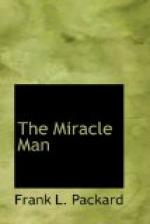John Garfield Madison, outside on the veranda of the Congress Hotel, smiled at the words, as he lighted his cigar and turned up his coat collar. He stepped off the veranda, crossed the little lawn to the village street, and began to saunter nonchalantly and indifferently oceanwards. He did not look around—he had no desire to bring consternation to the massed faces of the leading citizens flattened against the window panes—but he chuckled inwardly as he pictured them. There would be Hiram Higgins, postmaster and town constable, Walt Perkins, hotel man and town moderator, Lem Hodges, selectman, assessor and overseer of the poor, Nathan Elmes, likewise selectman, assessor and overseer of the poor, and Cale Rodgers, school committee-man and proprietor of the general store.
Madison sauntered slowly along.
“I have arrived,” he said, “not at a cemetery, but at an El Dorado and a land flowing with milk and honey.”
There was a humorous pucker around the corners of Madison’s eyes, as he reviewed his two days’ sojourn in Needley—spent mostly in the “office” of the Congress Hotel beside the stove with his feet up on the wood-box. He had never lacked company—the office stove and the spitbox filled with sawdust was the admitted rendezvous of the chosen spirits who were still gazing after him from the window. Morning, afternoon and evening they congregated there, and he had been promptly admitted to membership in the select circle. At each sitting they had discussed the spring planting and the weather, and then inevitably, led by Hiram Higgins, had resolved themselves into an “experience” meeting on the Patriarch—he, Madison, as a minority leader of one, grudgingly conceding an occasional point. The sessions had invariably ended the same way—Hiram Higgins, with the back of his hand underneath his chin, would stroke earnestly at his chin-whiskers, and remark:
“Well, now, Mr. Madison, ’twon’t do you a mite of harm to go out there an’ see for yourself. We’ve kinder got to look on you as one of us, an’ there ain’t no use in you sufferin’ around with what ails you when there ain’t no need of it.”
Madison’s replies had been equally void of versatility—he would shake his head doubtfully, while his cigar-case circulated around the group.
Madison sniffed luxuriously at his thoroughbred Havana. He had passed out of sight of the hotel window now, and he swung into a brisk walk. It was a mile to the Patriarch’s by a wagon track through the woods, that led off from the road to the left just across the bridge. He had not needed to ask directions. With magnificent inadvertence Hiram Higgins had mentioned the exact way to reach the Patriarch’s a dozen times, if he had once. Also, by now, Madison had learned all that the town knew about the Patriarch—which after all, he reflected with some satisfaction, wasn’t much. The Patriarch was over eighty years of age, and he had come, deaf and dumb, to Needley sixty years




